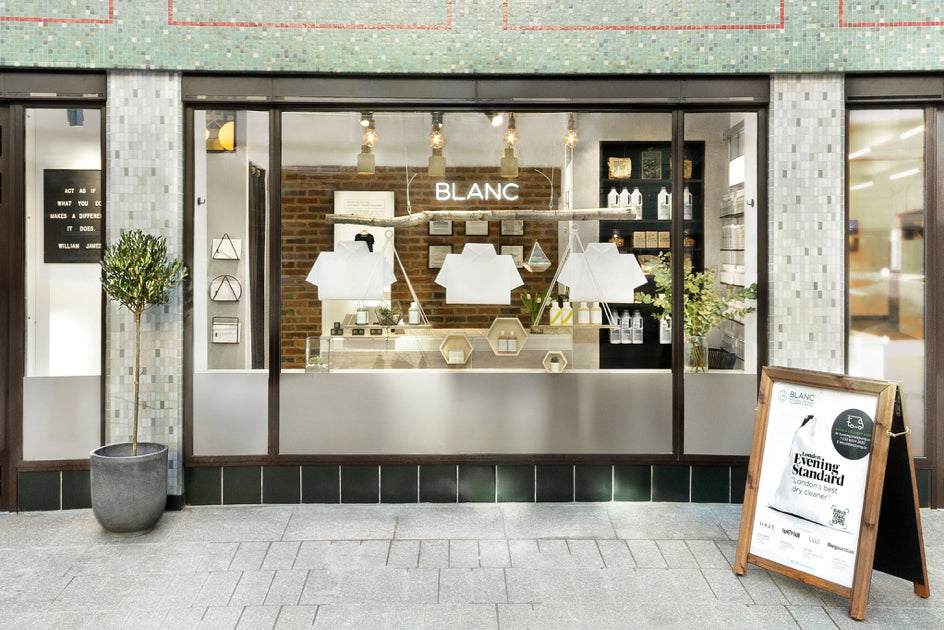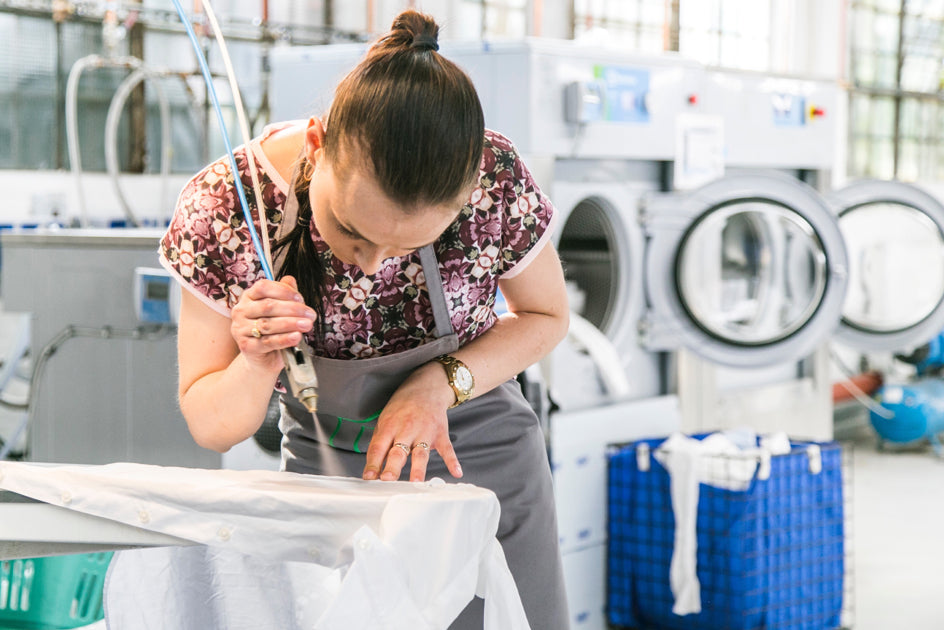BLANC Is Transforming The Dry Cleaning Industry
While seeing major disruptions to traditional business models has become the norm, some industries have resisted innovation for far too long. That’s why BLANC, a natural and high-quality dry cleaners, is taking on the dry cleaning industry as a whole — with its eyes set on transformation. “This industry is really still in the dark ages in so many ways, there is so much that needs to be improved — from customer service and the quality of the finish to the toxicity of the conventional process and the working conditions of most operators,” co-founder Mathilde Blanc tells What We See.
“My husband Ludovic started this business six years ago and since then we’ve been building it on the premise that we really need to change the industry.”
And they’ve definitely been changing it. Using only water and non-toxic products to clean clothes naturally, with a keen focus on sustainability issues as a whole, BLANC has turned into an award-winning natural dry cleaning phenomenon, with an extensive delivery service for fashion customers and individuals alike, and three stores in Notting Hill, Marylebone, and Chelsea. This Friday, February 1st, they’ll be opening their fourth location in the iconic Television Centre in White City — an event they’re celebrating not just as an expansion of their brand, but as a chance to spread their message.
Because there’s a reason that BLANC has won the Laundry and Dry Cleaning News Award for ‘Best Sustainability Policy Dry Cleaner’ in 2016, the ‘Best Sustainability and CSR – Dry cleaner’ Award in 2017, and the ‘Janey Loves’ Sustainability Award in 2018 — and it goes way beyond their incredible concept stores (which happen to have a warmth and sophistication that feels more like a high-end Scandinavian homeware store than a dry cleaner). They’re ready to completely transform the industry, in terms of health, sustainability, and customer experience.
Challenging Toxicity

BLANC’s new location in White City.
If you haven’t heard of PERC, you’re not alone — very few of us have any awareness of this toxic chemical that dominates the dry cleaning industry. “It can have serious consequences and yet a lot of people don’t know about it,” Mathilde says. And though PERC-aversion may be at the core of the BLANC brand, they aren’t alone — more and more, scientific and governing bodies are warning against the dangers of the widespread use of PERC. “Perchloroethylene (PERC) is the most commonly used dry cleaning solvent,” the Center For Disease Control and Prevention explains. “PERC can enter the body through respiratory and dermal exposure. Symptoms associated with exposure include: depression of the central nervous system; damage to the liver and kidneys; impaired memory; confusion; dizziness; headache; drowsiness; and eye, nose, and throat irritation. Repeated dermal exposure may result in dermatitis. NIOSH considers PERC a potential human carcinogen.” And yet, PERC still makes up 80 to 85 percent of all dry cleaning fluid.
It’s clear why BLANC is committed to doing things differently. Just as asbestos was put in homes everywhere 30 years ago in a way that would be unthinkable today, Mathilde is sure that we’ll soon be questioning our wide-spread use of PERC. “People need to be aware of the toxic products that they put on their clothes and then on their skin,” she says. And while PERC and other chemicals can be really damaging to our bodies, it also makes little sense that they’re used so extensively in the industry — because long-term, they’re damaging to the clothes they’re supposed to be caring for, with the high temperatures needed to evaporate them damaging textile fibres with every use.
Truly Sustainable Fashion

Non-toxic products on offer.
BLANC is committed to a minimalist, fully sustainable approach to clothes and wardrobe care, one that goes beyond just the manufacturing process.
“In fashion, there’s an increasing awareness of what we need to do to make the entire industry more sustainable from cradle to grave, including aftercare,”
Mathilde says. “We talk more about fast fashion, and customers are increasingly inquisitive about who made their clothes, and how. They demand more and more transparency — as they should. We’re interested in what’s happening after we have bought clothes that we really like and want to care for — how do you keep them alive for longer?” Even if you’re buying quality products, if they’re not cared for properly then any fashion can become fast fashion — which is terrible for the environment and bad for your wallet. “Just as a reference point, wearing clothes 50 times instead of 5 reduces carbon emissions by 400 percent per item, per year,” Mathilde says. That’s why BLANC not only offers cleaning services that are kinder to clothes, our health, and the planet, they also offer repairs and alterations, encouraging individuals and fashion boutiques alike to consider fixing, rather than throwing away, clothes that need a simple mend.
But they’re also going one step further. One of their most exciting projects is the BLANC Lab, which works with design houses to make sure that the textiles that are being used for collections are long-lasting and cleanable in a more sustainable way, to ensure their designs can stand the test of time. It’s something that not every company can afford to do on their own, so BLANC offers testing services to enable smaller brands to test and clean more of their designs ahead of commercializing them. BLANC Lab is also getting the conversation going about wet cleaning with larger brands — a process that designers had been generally quite adverse to before BLANC came along. Brands are now more than warming to the idea, with many partnering with BLANC for their aftercare needs — and leaders such as Reformation and Hugo Boss are already recommending “Wet Clean Only” on their garment care labels.
Even when talking about chronic industry problems, Mathilde is refreshingly interested in the bigger picture — how to improve the industry, rather than tout her own business.
“We’re here to make things change, to raise awareness — to get governments to pass regulations to forbid the use of PERC like Denmark, France, and California already have.”
A Very Human Business
 A BLANC employee at work.
A BLANC employee at work.
While the environmental and sustainability elements are at the heart of BLANC’s mission, they’re also keenly aware of the human side. It’s not just their stunning stores, which are unlike any dry cleaner you’ve ever experienced before, it’s also realizing the impact that the industry has on all of the people who come into contact with it — at every stage of the process. “Cleaning is a very human business, there are a lot of artisans and people working behind the scenes who are exposed to these chemicals in the traditional setup,” Mathilde says. Rather than the toxic chemicals used by conventional dry cleaners, BLANC uses biodegradable products and pure water. They work with the ethos that "wet is best", using the Electrolux Wet Cleaning System, which not only is endorsed by Woolmark and protects the integrity of clothes, but also creates a more sustainable cleaning process, free of harsh chemicals and toxins. It’s simply better for everyone — workers, customers, and, of course, wardrobes.
Mathilde emphasizes that this week’s launch is not just about their fourth store, but also about their greater message that we need to change how we approach fashion and dry cleaning as a whole. “Up until this point, we’ve been running a business with a mission that we’re passionate about and working hard to get our operation ready for scale,” she explains.
“We’re now at the stage where we really think the message about wet cleaning needs to get out there. We think the industry must change."
"We need the world to know.” They’re leading the way — and welcoming anyone who wants to join.
By Lea Rose Emery, January 2019
Find the original article here.
